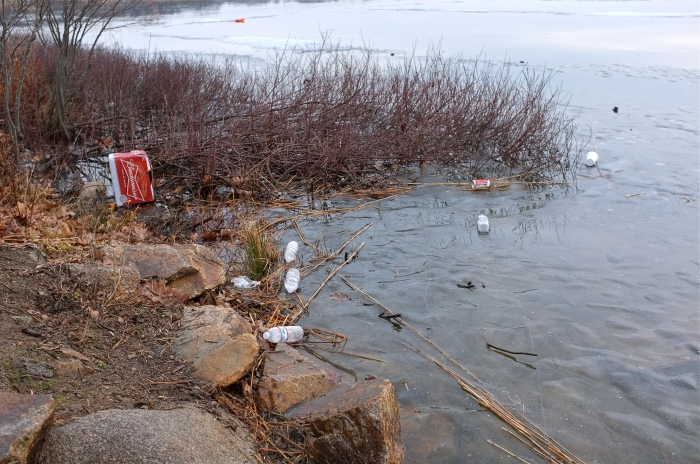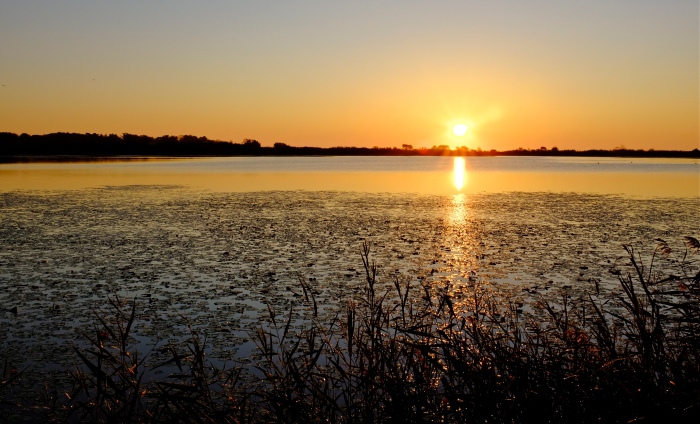The point of the Aftermath video is to showcase the litter, not who owns the pond. Thank you Daniel for pointing out the litter and thank you Anonymous for sharing that Niles Pond has Massachusetts Great Pond Status. And thank you to all who wrote comments-it just goes to show how much we all care about our beautiful Niles Pond and surrounding environment.
 Irrespective of who owns the pond, let’s all please not litter, and if you do see trash left behind, clean it up, and if you can’t manage the job yourself, email the wonderfully good eggs Donna Ardizzoni and her One Hour at a Time Gang for the really tough jobs.
Irrespective of who owns the pond, let’s all please not litter, and if you do see trash left behind, clean it up, and if you can’t manage the job yourself, email the wonderfully good eggs Donna Ardizzoni and her One Hour at a Time Gang for the really tough jobs.
From the Massachusetts Department of Environmental Protection website: Chapter 91 comprises four basic areas of geographical jurisdiction. Any activity that takes place in one of the hot link areas listed below requires Chapter 91 authorization. The areas are:
Flowed Tidelands – Any project located in, on, over or under tidal waters seaward of the present mean high water (MHW) shoreline. Jurisdiction in this case extends seaward three miles, to the state limit of territorial jurisdiction.
Filled Tidelands – The limit on filled tidelands is: A.) Outside Designated Port Areas, the first public way or 250 feet from mean high water, whichever is farther landward and B.) Inside Designated Port Areas, the historic MHW shoreline (i.e., all filled areas).
Great Ponds – Any project located in, on, over or under the water of a great pond. A great pond is defined as any pond or lake that contained more than 10 acres in its natural state. Ponds or lakes presently larger than 10 acres are presumed to be great ponds, unless the applicant provides unequivocal evidence to the contrary. Ponds 10 or more acres in their natural state, but which are now smaller, are still considered great ponds.
Non-Tidal Rivers and Streams – Projects located in, on, over, or under any non-tidal, navigable river or stream on which public funds have been expended either upstream or downstream within the river basin, except for any portions not normally navigable during any season by any vessel. Additionally, the Connecticut River, the Merrimack River and portions of the Westfield River are within jurisdiction.
Chapter 91: An Overview and Summary ~ Read more to find out how Great Pond Status directly affects Niles Pond:
Chapter 91: An Overview and Summary
The Commonwealth’s primary tool for protection and promotion of public use of its tidelands and other waterways is Massachusetts General Law Chapter 91, the waterways licensing program. The Commonwealth formally established the program in 1866, but the philosophy behind Chapter 91 dates back to the earliest days of the Massachusetts Bay Colony, most notably in the Colonial Ordinances of 1641-1647.
The Colonial Ordinances codified the “public trust doctrine,” a legal principle that dates back nearly 2000 years, which holds that the air, the sea and the shore belong not to any one person, but rather to the public at large.
The oldest program of its kind in the nation, Chapter 91 regulates activities on both coastal and inland waterways, including construction, dredging and filling in tidelands, great ponds and certain rivers and streams.
Through Chapter 91, the Commonwealth seeks to preserve and protect the rights of the public, and to guarantee that private uses of tidelands and waterways serve a proper public purpose. While other agencies, including the Department of Environmental Management, Massachusetts Coastal Zone Management and the Division of Fisheries and Wildlife, play a role in preserving public rights in public trust lands, the Waterways Regulation Program, the section of MassDEP that oversees Chapter 91, is the primary division charged with implementing the “public trust doctrine.” Specifically, the MassDEP Waterways Regulation Program:
Preserves pedestrian access along the water’s edge for fishing, fowling and navigation and, in return for permission to develop non-water dependent projects on Commonwealth tidelands, provides facilities to enhance public use and enjoyment of the water.
Seeks to protect and extend public strolling rights, as well as public navigation rights.
Protects and promotes tidelands as a workplace for commercial fishing, shipping, passenger transportation, boat building and repair, marinas and other activities for which proximity to the water is either essential or highly advantageous.
Protects Areas of Critical Environmental Concern, ocean sanctuaries and other ecologically sensitive areas from unnecessary encroachment by fill and structures.
Protects the rights of waterfront property owners to approach their property from the water.
Encourages the development of city and town harbor plans to dovetail local waterfront land use interests with the Commonwealth’s statewide concerns.
Assures removal or repair of unsafe or hazardous structures.
More than ever, the presence of a program like Chapter 91 is vital, especially because many of the fastest growing regions of the state, such as the North Shore, South Shore and Cape Cod and the Islands, are coastal areas. In these coastal areas, Chapter 91 regulations serve to protect traditional maritime industries, such as fishing and shipping, from displacement by commercial or residential development.



Thanks for the comment… also carry yellow or orang bags in your car.. you can pick them up at the DPW on Poplar street. Remember to be greener we need to be cleaner… pick up when you can and if you see something really messy call the DPW, they are very responsive.. Thank you Donna
LikeLike
Donna, the trash is STILL there. What is needed is one of those very long handled pool cleaning type tools. Does anyone have one that I can borrow? I will come and pick it up and return it to you.Thank you in advance.
LikeLike
Sad truth is, you see this everywhere, everyday. Recently walked by the salt marsh on the Causeway, it’s in a very sorry state. Near to impossible to take a stroll anywhere without seeing litter. I’m so glad the DPW offers the Yellow bags, we use them all year long down the Fort and on Pavillion Beach. It’s much like doing laundry, there’s no end to it.
LikeLike
I wonder what the penalty is for littering and/or dumping trash in a Great Pond?
LikeLike
Yes, in Massachusetts Great Pond is any natural pond over ten acres and the public has the right to use the shoreline for walking, fishing and fowling. However, I’m sure you will find that those rights are only provided if you can access the shoreline without going over private lands. Since the land around the pond and the roads are private, no state agency will enforce littering or dumping laws.
When I was a kid I kept a boat in Niles pond for a number of years. But, I kept it on adjacent private land with the owners permission. It’s a shame that some are careless or trashing it but I don’t see anything that can be done about it.
LikeLike
Nope! You can go right over private lands without the owners permission! You can not stop anyone as long as they are “fishing, fowling (hunting) and navigation” In return for permission to develop non-water dependent projects on Commonwealth tidelands, provides facilities to enhance public use and enjoyment of the water” IN SHORT thanks for building a house there but i’m going fishing, fowling (hunting) and doing navigation stuff. If I’m not then you can stop me from walking across you property. I.e hockey plays.
LikeLike
The trash was left behind by stupid kids and young adults. Next time there is ice, go down there and read them the riot act. These kids don’t give a rats ass about littering. They were obviously raised by wolves and Walgreens-shoppers! Next time there is ice , stop by and give them shit! I guarantee they are not reading this blog so shut the he’ll up with all yer preaching! Shut your self-righteous pie holes.
LikeLike
I think you mean wolves and WalMart Shoppers. LOL but realy Chill out, have a glass of nice wine ,view a nice sunrise or Take a pill.
LikeLike
Joanne are you this hateful around the house or at work or do you just save it all up for GMG?
LikeLike
I think Joanne needs a hug.
LikeLike
I’m available 🙂
LikeLike
… for a hug , that is.
LikeLike
Why don’t these so called owners pick up the trash. After all, if they don’t want you to walk on the land, then you shouldn’t be going on it to clean. What it comes down to is & this is just my opinion, I think that nobody should own any land between their place & the waterline. Once when I was walking on one of the beache I saw a sign up that said no tresspassing. Well, all I can tell you is that for 2 years I had been walking in that area & all of a sudden I see this sign. My reaction was ” sorry, I always sit on those rocks & I will continue to sit on those rocks. These rocks are down from the main part of the beach. I don’t think it was somebody playing a joke but then again this sign was in the sand but there was no house in front of the wall. Just a house across the street. And maybe I don’t know enough about this to even write my opinion down. So there. And Joey & House Doctor, I agree with both of you.
LikeLike
For Heaven’s sake Elaine. Don’t you know how to spell??? There is only 1 s in trespassing. Not tresspassing. GEEZ!!! Learn to spell will ya…LOL…
LikeLike
i save it all for GMG! I welcome hugs!! Just mixing it up with the GMG love-fest!! It’s just dumb kids!!! I pick up litter all over, and doubt litter bugs are reading the blog.
LikeLike
Joey – to make up for my anger-fueled rampage regarding the thoughtless litters … if the trash is still there tomorrow, i promise to get it –
LikeLike
Beer-drinking, car-driving, ?kids?, some with five o’clock shadows–this was a group of adults and older teens and old enough to know better.
I have photographed all around Eastern Point and have never been told that I was trespassing. I treat Eastern Point like every other neighborhood in Gloucester, with respect. I pick up trash when I see it and try to leave it better than when arrived. There are tons of people in our community who also do just that, on a daily basis. Trash left behind by some few thoughtless individuals effects everyone in Gloucester and fortunately, the litterbugs are in the minority.
Thank you also to Brian O’Connor for clarifying, re accessing ponds through private lands. From the waterways program doctrine:
Preserves pedestrian access along the water’s edge for fishing, fowling and navigation and, in return for permission to develop non-water dependent projects on Commonwealth tidelands, provides facilities to enhance public use and enjoyment of the water.
Seeks to protect and extend public strolling rights, as well as public navigation rights.
LikeLike
Kim: because i skate at the pond – yes – agreed, they are old enough to know better. They are apathetic, beer drinking, car driving kids/older teens/young adults. I have no answer for you why they are this way – they don’t belong to me. I get crazy-frustrated by people who litter and have no problem with picking up after them.
LikeLike